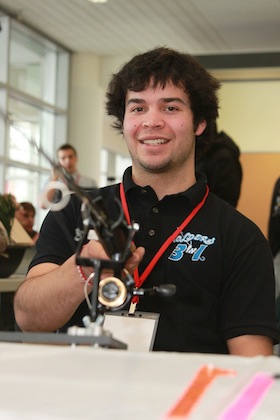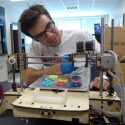Fishing rod holder for boat, land or ice is champion of 2013 innovation competition
A self-adjusting, boat-mounted holder for fishing rods has won the top prize and $10,000 in the Schoofs Prize for Creativity, one of a pair of University of Wisconsin–Madison innovation competitions. Held Feb. 7 and 8, the Innovation Days competitions reward UW–Madison undergraduates for creative and marketable ideas.
By self-adjusting as boats bob in choppy water, the rod holder — called the CFS Holder — keeps the bait steady relative to the bottom of a body of water, and thus, says inventor Justin Vannieuwenhoven, looks more natural to fish. Vannieuwenhoven, a senior studying biological systems engineering, says he was inspired by his grandfather, who fishes frequently on Green Bay and complained to him that fish were harder to catch on days with rough weather and bigger waves.

Justin Vannieuwenhoven, a senior studying biological and systems engineering, demonstrates his design for a self-adjusting fishing rod holder.
Photo: Mark Riechers
“If it wasn’t for him, I wouldn’t be standing up here today,” Vannieuwenhoven says.
In addition, unlike other holders for fishing rods on the market, the holder’s construction makes rods less likely to pull out when a fish bites, and allows easier access for fishers to change their bait after a catch and get back to fishing. And, unlike other holders, the CFS Holder also can be used on ice or land.
Vannieuwenhoven already has tested his invention with the help of several experienced fishers, who have reported higher success rates during rough weather. He has filed a provisional patent application for his design, and plans to give away 100 at an upcoming trade show to collect feedback for further improvements. But, Vannieuwenhoven says, at least one target market is already satisfied: “My grandpa has six to eight on his boat at all times,” he says. “He’s in love with it.”
Vannieuwenhoven, who entered a second idea in this year’s competition and won fourth place in last year’s Schoofs Prize for his electronic “coal” for burning tobacco in hookahs, says his key to success is keeping his ideas simple.
“I seem to have a lot of random ideas,” he says. “By keeping things simple, it helps people understand the problems more easily, and it’s easier to go through all the steps of making an idea real.”
In addition to the top Schoofs Prize, Vannieuwenhoven also won third place and $700 in the Tong Prototype Prize, which rewards students for building their ideas.
The winners of the $2,500 Tong Prototype Prize, the second major Innovation Days competition, were biological systems engineering senior Luke Stedman and mechanical engineering senior Steve Burbach, who created TreeREX, a safe, portable tree stand for hunters.
“The Innovation Days competition is successful to the degree that it encourages the students to become free-thinkers, to foster their own inherent talents, to recognize the importance of good communication skills, and to give at least some consideration to an entrepreneurial career.”
Richard Schoofs
Burbach and Stedman, both hunters themselves, identify two main problems with hunters’ tree stands as they currently exist: They’re either preassembled stands that are cumbersome and must be trucked in to the hunting site, or the assemble-as-you-climb variety, which are extremely dangerous to set up and precarious to hunt from. The two also point to falls from tree stands as the leading cause of deaths during Wisconsin’s gun deer season. In fact, Stedman took a bruising, 20-foot fall from a tree stand two years ago, and says it was one of the main inspirations for the project. “I figured there had to be a better way to get up there,” he says.
In contrast to what’s currently available, the TreeREX has a pair of steel “jaws” that clamp around a tree trunk, and that use the hunter’s weight to secure the clamp. The heavier the hunter, the firmer the grip on the tree. And, at 30 pounds, it can easily be carried on the hunter’s back.
Furthermore, Burbach and Stedman say, the TreeREX can be assembled safely before the hunter even leaves the ground.
In addition to the top Tong Prize, Burbach and Stedman also won fourth place and $1,000 in the Schoofs Prize for Creativity.
Chemical engineering alumnus Richard Schoofs, who sponsors the Schoofs Prize, said he was impressed with the ideas he had seen in this year’s competition. “The Innovation Days competition is successful to the degree that it encourages the students to become free-thinkers, to foster their own inherent talents, to recognize the importance of good communication skills, and to give at least some consideration to an entrepreneurial career,” he says.
Schoofs is impressed with the students’ dedication. “And I am very impressed with how enthusiastic they are about ‘selling’ their ideas,” he says. “These are the essential attributes of a successful entrepreneur.”
Past Innovation Days participants have gone on to create businesses based on their innovations. Steve Cramer, College of Engineering associate dean for academic affairs and a speaker at this year’s event, says participants likely learned valuable lessons from the process. “It takes a great deal of time and energy to develop and present these innovations and I applaud the efforts of all our participants,” he says. “Your presentations and prototypes are evidence of the effort and creativity that went into your inventions.”
Cramer also emphasized the importance of building prototypes to entrepreneurs’ success. That’s the motivation behind the Tong prototyping prize: “Not only does building a prototype give you the satisfaction of watching your idea become reality, it also shows the importance of prototyping to the entire invention process,” he says.
Other Schoofs Prize winners include:
- Second place and $7,000: Chi Band, a wristwatch-style biofeedback device that uses wearers’ skin temperature, heart rate, and perspiration levels to help them understand and manage their stress levels. Invented by Steve Hansen, a sophomore in mechanical engineering and management and human resources, and Steven Ledvina, a sophomore in economics and psychology.
- Third place and $4,000: American Press, an automatic French press-style coffee maker that can be scaled for consumer, commercial or industrial use. Invented by chemical engineering junior Cedric Kovacs-Johns.
- Fourth place and $1,000: TreeREX Tree Stand.
Other Tong Prototype Prize winners include:
- Second place and $1,250: American Press.
- Third place and $700: CFS Holder.
Additional prize winners include:
- Sorenson Best Design Notebook Award and $1,000: Lecture Vault, a hardware and software assembly to automatically digitize lectures or presentations, stream them in real time online, and extract written notes and transcripts from what it records. Invented by mechanical engineering senior Michael Szewczyk.
- Younkle Best Presentation Award and $1,000: Chi Band.
Tags: engineering, entrepreneurship

